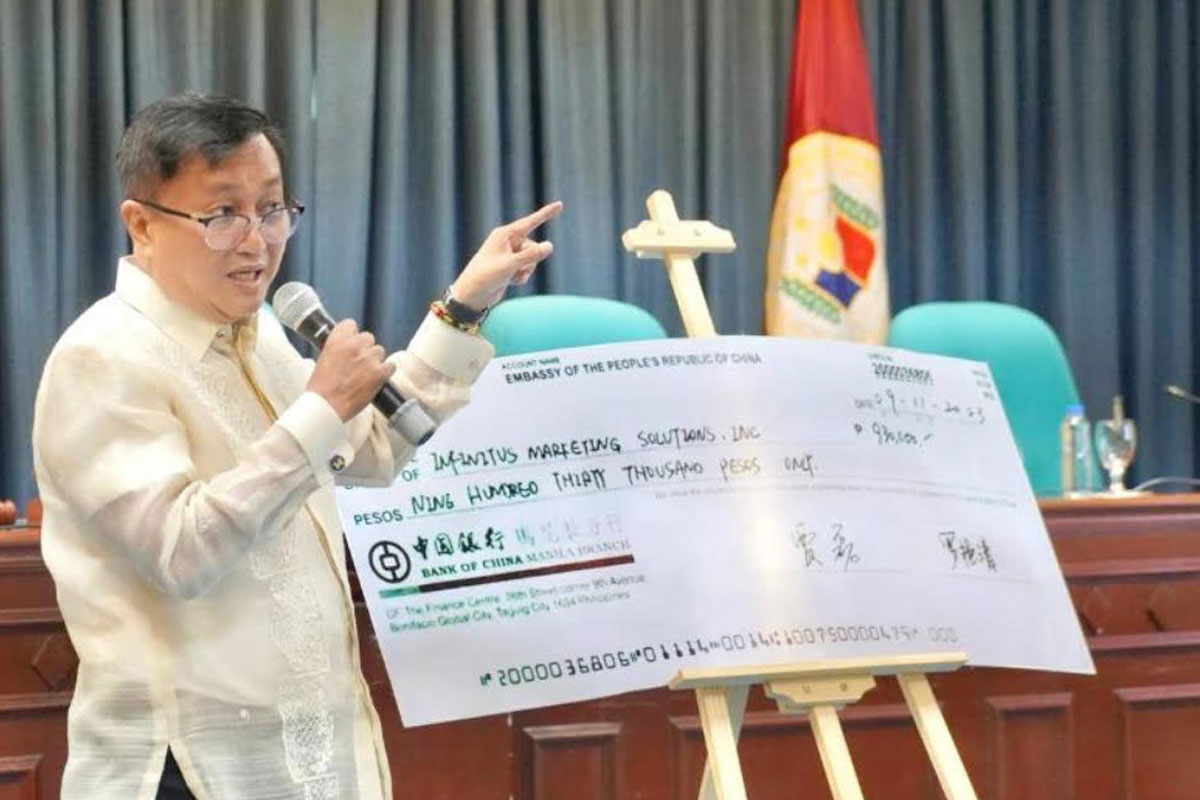
New Agrarian Emancipation Act a win for farmers
TWO Bicolano lawmakers on Wednesday hailed the New Agrarian Emancipation Act to be signed on Friday by President Ferdinand “Bongbong” Romualdez Marcos, Jr. as a win for farmer-beneficiaries, who will now be unburdened of their obligations to the government for parcels of land they received under the Comprehensive Agrarian Reform Law of 1988.
Albay 2nd District Rep. Joey Sarte Salceda and AGRI Rep. Wilbert T. Lee said the signing ceremony is the best and biggets accomplisment of President Marcos.
“This will be the hallmark of the Marcos administration’s inaugural year in office. It’s historic in scale, in worldview, and in what it will bring to the people,” Salceda said.
“We often abuse the word “landmark” legislation a lot. But that is what this bill is. Landmark legislation. It corrects one of the first errors of the Comprehensive Agrarian Reform Program – which was to tie down land. When, really, as owners of the land, farmers have a right to be able to use and, if necessary, convey it to the best users.”
Lee said “we thank President Bongbong Marcos for signing into law this measure that has long been sought by our farmers.”
“Finally, they will be unburdened of their loans, interests, and penalties that contribute to their inability to overcome poverty, and are also major factors that have kept them from becoming fully productive,” Lee said.
Lee, principal author of the House version of the New Agrarian Emancipation Act (NAEA), said that the new law would allow farmers to further increase their productivity by providing them additional financial resources through the condonation of their annual amortization and interests, including penalties or surcharges.
The new measure effectively condones an estimated ₱58.125 billion in unpaid amortization amounts, interest payments, surcharges, and penalties of existing loans of some 654,000 agrarian reforms beneficiaries (ARBs) secured under the Comprehensive Agrarian Reform Program (CARP), repealing Section 26 of RA No. 6657, as amended, and Section 6 of EO No. 228, series of 1987, as well as pertinent provisions of other agrarian laws.
It also mandates the Department of Agrarian Reform (DAR) to issue, whenever necessary, a Certificate of Land Ownership Award (CLOA), or any other title based on the applicable agrarian reform law, and provides that condonation shall lift all mortgage liens in favor of the national government, as represented by the Land Bank of the Philippines (LBP), attached to the land acquired.
Moreover, the new law exempts the agrarian reform lands of ARBs, as estates, from the payment of estate tax.
“Dahil marami po sa ating mga ARBs ang nalulugmok sa kahirapan, kapag tinanggal po natin sa kanila ang kanilang mga pinagkakautangan ay bababa rin po ang dami ng mahihirap sa ating bansa,” said the lawmaker.
“Mabibigyan na ang ating mga magsasaka ng pagkakataon na iahon ang kanilang mga sarili sa kahirapan at maki-ambag sa pag-angat ng ating ekonomiya. Ito po ang ibig nating sabihin sa Winner Tayo Lahat,” added Lee.
The legislator explained that “by eliminating their debt, our farmers can focus more on their land. They would be able to devote the resources they would otherwise have used to pay off debts for the development of their land and the improvement of their farming practices.”
The New Agrarian Emancipation Act covers a total of 1.18 million hectares of awarded land. The total emancipated land area will require an additional ₱4.7 billion in funding for seed subsidies.
Salceda said it os “also an important step towards rural and agrarian justice. More than 69% of poverty in this country is rural. The DAR’s purpose was to accelerate rural development. But because agrarian lands were tied down, in liens and due to the non-transferability restriction, they could not maximize output. It consigned rural areas to low economic activity. There was no way rural areas were going to catch up to urban areas in terms of development without first freeing up land – the most important factor of production.”
According to Salceda, “CARP without adequate support services and with limited capital or entrepreneurship among farmer-beneficiaries is shown to have reduced agricultural productivity in CARP lands by as much as −34.1% compared to baseline.”
“This has resulted in almost P418 billion in lost productivity for all CARP lands every year (for the 10.3 million hectares of CARP land).
“Condonation of ARB debts could result in increase in productivity of between 23.8% (as the market can now allocate the land more efficiently) and 38.3% if productivity-enhancing interventions are increased (which the bill proposes) among the lands condoned,” Salceda said.
“Taken together, that is P629 billion more in economic output for the land condoned, assuming it remains used as just agricultural land. Of course, there will be more uses, including for renewable energy,”
The New Agrarian Emancipation Act will condone 58.125 billion pesos benefiting 654,000 agrarian reform beneficiaries and involving a total of 1.18 million hectares of awarded lands.
Salceda also introduced additional provisions such as an Estate Tax Amnesty until 2025 and exemption for estate taxes for transfers to legitimate heirs and successors, which were adopted into the upcoming law.
“That will also help expedite the productive use of the land. Frankly, I don’t know why we ever expected farmers without capital, networks, infrastructure, and economic power to succeed in tilling land. We should have done more to provide agrarian support. And we should not have tied them to the land,” Salceda said.
“So, this law, in every sense of the word, is emancipation. Emancipation of farmers from debt. Emancipation of rural areas from a destiny of poverty. Emancipation of land from perpetual idleness,” Salceda said.





















